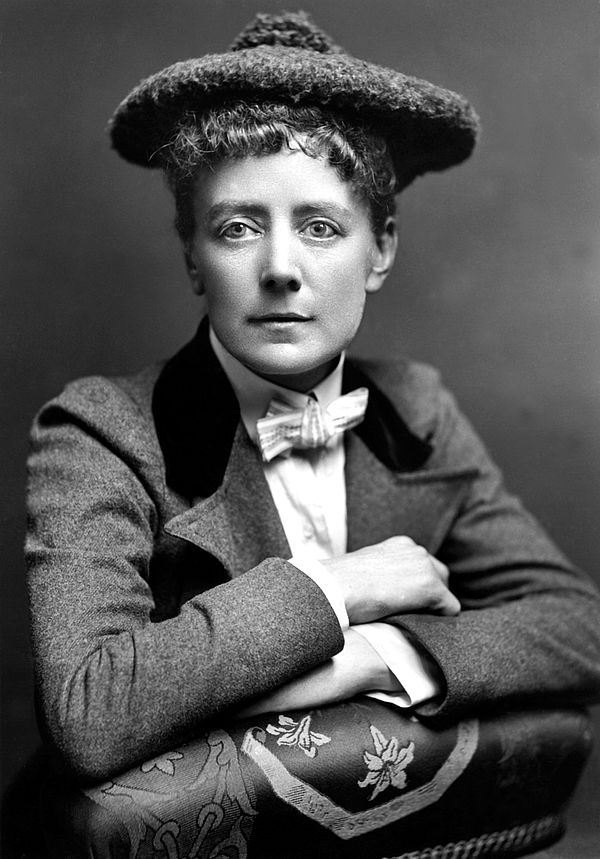Houston Grand Opera eager to set sail with Smyth’s “The Wreckers”

Stage director Louisa Muller makes no pretense about her history with Ethel Smyth’s The Wreckers. Until Houston Grand Opera invited her to stage it, “I didn’t know the piece at all,” she says. “I didn’t know Ethel Smyth’s work at all, I’m ashamed to say.”
“I got a score and listened, and I got really excited about it. It’s wonderful that she’s having a resurgence.”
This British composer from a century ago has benefited from the past couple of years’ renewed focus on female artists. HGO will contribute to Smyth’s renaissance when it unveils a new production of The Wreckers Friday night at Wortham Theater Center.
The bulk of HGO’s audience will likely arrive at the theater just as unfamiliar as Muller was with Smyth’s drama. The saga tells of a poor seaside village that supports itself by luring ships to run aground, then stealing their cargoes. At the center of the story, the opera’s hero and heroine fall in love as they try to stop the violence.
HGO bills its staging as The Wreckers’ first full-scale production by a major American company. (The Bard SummerScape festival in New York state mounted the work in 2015.)
“The Wreckers is a beautiful, grand, epic, gothic romance,” says Patrick Summers, HGO’s artistic director, who will conduct. “It takes on, as a subject, the common hypocrisies of people when they stop thinking for themselves, and this was certainly something Dame Ethel Smyth knew a lot about!
“She was a uniquely brilliant person in an era in which full personhood was only available to men, and classical music in particular was an exclusive men’s club.”

Born in England in 1858, Smyth waged a lifelong rebellion against prevailing views about women’s roles in society. Forging a career as a composer was only the beginning: She also threw herself into the fight to win women the right to vote. Smyth composed The March of the Women as the movement’s battle cry. “Life, strife, these two are one! Naught can ye win but by faith and daring,” it declares.
She lived up to those words. After a demonstration that involved hurling rocks at the homes of politicians who opposed women’s suffrage, Smyth and her fellow protesters landed in prison—Smyth for two months. One champion of her music, conductor Thomas Beecham, paid a visit.
“I arrived in the main courtyard,” Beecham recalled in his memoirs, “to find the noble company of martyrs marching round it and singing lustily their war chant while the composer, beaming approbation from an overlooking upper window, beat time in almost Bacchic frenzy with a toothbrush.”
The Wreckers grew from impressions Smyth took away from a trek along England’s Cornish coast, where she ventured into caves that smugglers had once used as hideouts. Returning to the area as her opera took shape in her mind, she quizzed the locals about tales of long-ago villagers—the “wreckers” of the work’s title—who tricked ships into running aground, slaughtered the crews, then made off with the cargoes.
What’s more, she recalled in her memoirs, they thought they did all that with divine permission.
“These Cornish savages had come to believe that like the Israelites in the Old Testament they were God’s Chosen People, whose right, nay, whose duty it was to plunder and extirpate less favoured peoples,” Smyth wrote.
She and librettist Henry Brewster transformed that killing, looting and fanaticism into the world of The Wreckers.
At the center of the story, a pair of lovers, Mark and Thirza, rebel against the violence. Thirza forsakes her husband, the village’s fire-and-brimstone parson, and Mark turns his back on his sweetheart, Avis, whose resentment turns her into a troublemaker—all of which leads to a tragic (but very operatic) end.
Librettist Brewster had to bribe an impresario 1,000 pounds sterling to persuade him to premiere The Wreckers in Germany in 1906, Smyth recalled in her memoirs. The conductor cut the score so severely that the indignant composer stormed into the pit after opening night, grabbed the orchestral parts and took them away.
Thanks to the financial backing of a rich friend of Smyth’s, Beecham produced and conducted six performances of The Wreckers in London in 1909. Even his advocacy couldn’t give the work a foothold in the repertoire, though the work has maintained a band of admirers over the ensuing century, including HGO’s music director.

“I first knew the opera through my conducting teacher and mentor Sir Charles Mackerras, and it was one of those many overlooked masterpieces that he particularly loved,” Summers says. “I’ve had it on my secret wish list for many years.”
“‘Grand’ is in [HGO’s] name, and few operas are as fully grand as The Wreckers. This is a story told through the frame of an enormous chorus and orchestra. As great as the major roles are, and they are, this is a choral opera par excellence. They are the title character.”
Cornish villagers of the 18th century really did pilfer wrecked ships, but the killing Smyth evokes may belong to legend rather than historical fact, Muller notes. Nevertheless, since British law made it illegal to take a ship’s cargo if its crew lived through the crash, “it’s not too much of a logical leap” to imagine that desperate villagers might cement their claim to the loot by killing any survivors.
In any case, the opera’s premise is “rife with dramatic possibilities,” Muller says.
“The aspect of mob violence and groupthink—and how an insular community can turn on outsiders and each other—is a really interesting theme to explore,” she continues. The hero and heroine add “a story of love and hope and trying to act on your ideals, when you’re in a community that isn’t supporting that.”
Smyth’s score brings that community to life through “incredibly compelling, exciting choruses,” Muller said. Some of them have an aura of hymns or prayers, she noted, while the villagers’ violence bubbles up in others—especially the “amazing chorus at the end of Act 1, where they get ready to go wrecking.”
Ticking off his own examples of the score’s most memorable moments, Summers began with “the great love tune in the overture, which we hear throughout (the opera)—but its first intoning is particularly beautiful.
“The folk songs sung by the character of Mark are quite beautiful. The love duet in the second act shows what so many composers tried for more than fifty years, which was to recreate, or at least differently create, the second act of Wagner’s Tristan and Isolde.”

In that Act 2 duet, Mark and Thirza have the stage almost entirely to themselves for 30 minutes.
“I think anybody who’s an actor or performer loves this kind of challenge,” says mezzo-soprano Sasha Cooke, who portrays Thirza in HGO’s production.
“You have to relate to someone in the opera, and the two characters you relate to most are Thirza and Mark. Act 2 is the heart of the piece. You understand their union. You understand their purpose.”
Like Summers and Muller—and the rest of HGO’s cast, Summers adds—Cooke is tackling The Wreckers for the first time. When HGO offered her the role of Thirza, she began by looking through a score and listening to some of the opera online.
“I thought, ‘OK, this is all the things I thought it would be—dramatic and challenging,’” Cooke says. “I love to be stretched. I tend to sing a lot of contemporary music, and that will often stretch you musically or intellectually, but not necessarily vocally or dramatically. So I was excited that this has some heroic, almost Wagnerian singing.”
Cooke hears influences of Wagner, Debussy and Elgar in the music, while she thinks the story has echoes of Smyth’s own life. “I have a hunch that my character is a little autobiographical—that it’s kind of Ethel Smyth,” Cooke says. “She also struggled with society. … She went her own way, carved her own path. That’s the crux of (Thirza), too.”
HGO will perform The Wreckers using a 21st-century adaptation of the text by the British author and librettist Amanda Holden. It preserves the period flavor while filtering out some archaic wording—thee, thou, whilst and such—so “we can immerse ourselves in the story,” Muller says.
The Wreckers boasts an immediacy that will help outweigh its lack of familiarity, Cooke says. She finds it “a timely piece.”
“It’s a love story, it’s social conflict—it’s all these things we can relate to,” Cooke says.
“Everybody is following the pastor. They’re doing what they’re told. Then you have these two characters who are standing up against the rest. I think it’s kind of cathartic to see them go through what they go through.”
The Wreckers opens at Houston Grand Opera 7:30 p.m. Friday and runs through November 11 at Wortham Theater Center. houstongrandopera.org